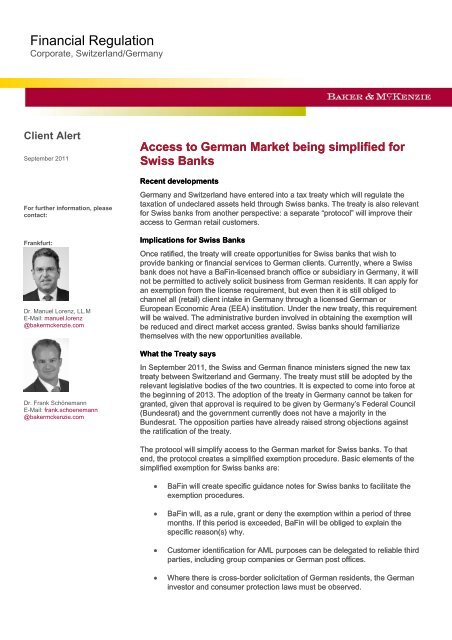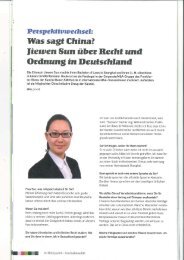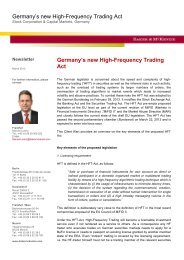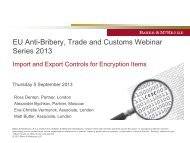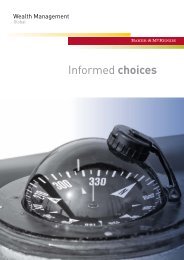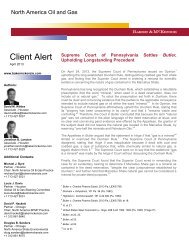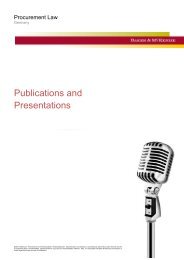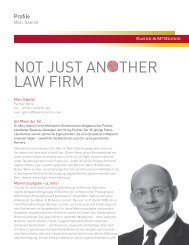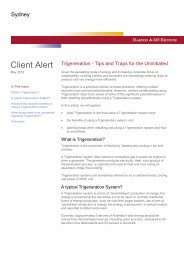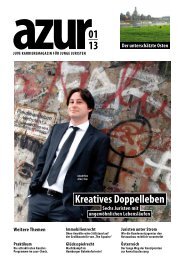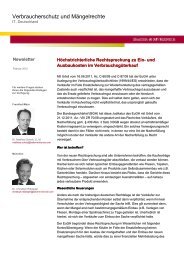Financial Regulation - Baker & McKenzie
Financial Regulation - Baker & McKenzie
Financial Regulation - Baker & McKenzie
Create successful ePaper yourself
Turn your PDF publications into a flip-book with our unique Google optimized e-Paper software.
<strong>Financial</strong> <strong>Regulation</strong><br />
Corporate, Switzerland/Germany<br />
Client Alert<br />
September 2011<br />
For further information, please<br />
contact:<br />
Frankfurt:<br />
Dr. Manuel Lorenz, LL.M<br />
E-Mail: manuel.lorenz<br />
@bakermckenzie.com<br />
Dr. Frank Schönemann<br />
E-Mail: frank.schoenemann<br />
@bakermckenzie.com<br />
Access to German Market being simplified for<br />
Swiss Banks<br />
Recent developments<br />
Germany and and Switzerland have entered into a tax treaty which will regulate the<br />
taxation taxation of of undeclared assets held through Swiss banks. The treaty is is also relevant<br />
for Swiss banks banks from another perspective: a separate “protocol” will improve their<br />
access to to German retail customers.<br />
Implications for Swiss Banks<br />
Once ratified, ratified, the treaty will create opportunities for Swiss banks that wish to<br />
provide banking or or financial services to German clients. Currently, where a Swiss<br />
bank does not have have a BaFin-licensed branch office or subsidiary in Germany, Germany, it will<br />
not be permitted to actively solicit business business from German residents. residents. It can apply for<br />
an exemption from the license requirement, but even then it is still obliged to<br />
channel all (retail) client client intake intake in Germany through a licensed licensed German or<br />
European European Economic Area Area (EEA) institution. institution. Under the new treaty, this requirement<br />
will be waived. The administrative burden involved in obtaining the exemption will<br />
be reduced and direct market access granted. Swiss Swiss banks should should familiarize familiarize<br />
themselves with the new opportunities available.<br />
What the Treaty says<br />
In September 2011, the Swiss and German finance ministers signed signed the new tax<br />
treaty between Switzerland and Germany. The treaty must still be adopted by the<br />
relevant legislative bodies of the the two countries. It is expected to come come into force at<br />
the beginning of 2013. The adoption of the treaty in Germany cannot be taken for<br />
granted, given that approval is required to be given by Germany’s Federal Council<br />
(Bundesrat) and the government currently does not have a majority majority in in the<br />
Bundesrat. The The opposition parties have already raised strong objections against<br />
the ratification of the treaty.<br />
The protocol protocol will simplify access to the German market for Swiss Swiss banks. To that<br />
end, the protocol creates a simplified exemption procedure. procedure. Basic elements elements of the<br />
simplified exemption for Swiss Swiss banks are:<br />
� � BaFin will create create specific guidance notes for Swiss banks to facilitate the<br />
exemption procedures.<br />
� � BaFin will, as a rule, grant or deny deny the exemption within within a period of three<br />
months. If this period period is exceeded, BaFin will be obliged to to explain the<br />
specific reason(s) why.<br />
� � Customer identification for AML purposes can be delegated to reliable third<br />
parties, including group companies or German post offices.<br />
� � Where there is cross-border solicitation of German residents, the German<br />
investor and consumer protection laws must be observed.
<strong>Financial</strong> <strong>Regulation</strong><br />
Berlin<br />
Friedrichstrasse 79-80<br />
10117 Berlin<br />
Tel.: +49 (0) 30 2 03 87 600<br />
Fax: +49 (0) 30 2 03 87 699<br />
Duesseldorf<br />
Neuer Zollhof 2<br />
40221 Duesseldorf<br />
Tel.: +49 (0) 211 3 11 16 0<br />
Fax: +49 (0) 211 3 11 16 199<br />
Frankfurt / Main<br />
Bethmannstrasse 50-54<br />
60311 Frankfurt/Main<br />
Tel.: +49 (0) 69 2 99 08 0<br />
Fax: +49 (0) 69 2 99 08 108<br />
Munich<br />
Theatinerstrasse 23<br />
80333 Munich<br />
Tel.: +49 (0) 89 5 52 38 0<br />
Fax: +49 (0) 89 5 52 38 199<br />
www.bakermckenzie.com<br />
� The Swiss bank must agree that BaFin is permitted to participate in on-site<br />
inspections in Switzerland performed by FINMA regarding compliance with<br />
German investor and consumer protection laws (based on procedures still<br />
to be agreed between the two regulators, together with other technical<br />
details).<br />
In addition, the distribution of Swiss securities funds in Germany (and vice versa)<br />
will be simplified, in particular by accepting and confirming the UCITS conformity in<br />
a relevant agreement.<br />
Unfortunately, the new rules will not apply to Swiss investment firms such as asset<br />
managers and investment advisers. Nor will they apply to financial services such<br />
as leasing, factoring or payment services, if operated by non-banks.<br />
Actions to consider<br />
As soon as both parliaments have ratified the treaty, Swiss banks that do not yet<br />
have an exemption and that are interested in expanding their business to Germany<br />
should reconsider their current approach:<br />
� They should follow any developments in this area, particularly once the<br />
technical details for the simplified exemption procedure have been<br />
published.<br />
� They should assess whether doing business under the simplified<br />
exemption could fit their current (German) set-up from a regulatory and<br />
also from a tax perspective. The alternative would be to establish a branch<br />
office or subsidiary fully licensed by BaFin.<br />
� Before contacting BaFin, they should assess whether they have been fully<br />
compliant in the past. The rules are quite restrictive and any cross-border<br />
business targeted at German clients in breach of German law would result<br />
in prosecution.<br />
Conclusion<br />
The new tax treaty significantly simplifies access to the German market for Swiss<br />
banks. Therefore, Swiss banks should closely follow the developments in this area<br />
and assess the new opportunities available, as well as the compliance of their<br />
current German set-up with German supervisory law.<br />
<strong>Baker</strong> & <strong>McKenzie</strong> can advise clients comprehensively in this area. We have<br />
significant experience and expertise in advising Swiss financial institutions on<br />
German regulatory law.<br />
This client newsletter is prepared for information purposes only. The information contained therein should not be relied<br />
on as legal advice and should, therefore, not be regarded as a substitute for detailed legal advice in the individual<br />
case. The advice of a qualified lawyer should always be sought in such cases. In the publishing of this Newsletter, we<br />
do not accept any liability in individual cases.<br />
<strong>Baker</strong> & <strong>McKenzie</strong> - Partnerschaft von Rechtsanwälten, Wirtschaftsprüfern, Steuerberatern und Solicitors is a<br />
professional partnership under German law with its registered offices in Frankfurt/Main, registered with the Local Court<br />
of Frankfurt/Main at PR No. 1602. It is associated with <strong>Baker</strong> & <strong>McKenzie</strong> International, a Verein organized under the<br />
laws of Switzerland. Members of <strong>Baker</strong> & <strong>McKenzie</strong> International are <strong>Baker</strong> & <strong>McKenzie</strong> law firms around the world. In<br />
common with terminology used in professional service organizations, reference to a "partner" means a professional<br />
who is a partner, or equivalent, in such a law firm. Similarly, reference to an "office" means an office of any such law<br />
firm.<br />
2


